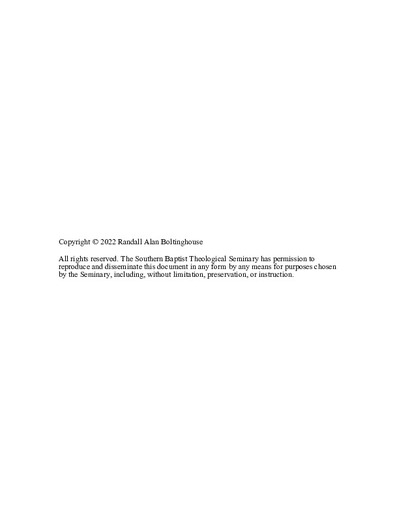E.K. Bailey's Hermeneutic for Preaching
Abstract
E. K. Bailey’s (1945-2003) pulpit ministry at Concord Baptist Church, Dallas, Texas, demonstrated the non-monolithic nature of Black Sacred Rhetoric. Bailey’s preaching employed an author-centered hermeneutic while attending to the life situation of the Concord congregation. This dissertation will argue that Bailey’s expository preaching was supported by a twofold interpretive lens, Afro-ethnic Ecclesial Kinship and Bibliocentric Christoformity. Bailey preached the Christian Scriptures (1) in connection with his ethnic and ecclesial community and (2) in submission to Scripture’s authorial intent for communal formation in Christ. Bailey valued the pursuit of the biblical authors’ meanings and their applications to the congregation he served. Chapter 1 introduces Bailey’s significance and pulpit legacy as an expository preacher. Chapter 2 discusses his life, education, and ministry years at Concord Church. Chapter 3 situates Bailey’s hermeneutic in the landscape of six major hermeneutical districts of Black Sacred Rhetoric and locates him in biblical exposition within his African-American ethnicity. Chapter 4 explains Bailey’s two principal hermeneutical influencers: A. Louis Patterson, Jr., and Henry H. Mitchell. Chapters 5 and 6 explicate Bailey’s twofold lens, which the reader will see in Bailey’s homiletical expositions on Ephesians in addition to other sermons preached during Bailey’s most experienced years at Concord. Chapter 7 discusses implications for expository preaching based on Bailey’s life and ministry. Chapter 8 concludes with further research opportunities on Bailey.
The dissertation amplifies the overlooked and under-published author-centered hermeneutic in Black Sacred Rhetoric. It presents Bailey as an echo of W. E. B. Du Bois’s “Black Pastor” and a contemporary complement to Daniel R. Bare’s “Black Fundamentalist” pastor during Segregation. It shows how Bailey was able to incorporate biblical exegesis grounded in authorial intent without neglecting the unique, historical context of the African-American community he was called to pastor. Through the interpretive assumptions that grounded his preaching, Bailey trailblazed a path for a future generation of author-centered hermeneutics in Black Sacred Rhetoric.

